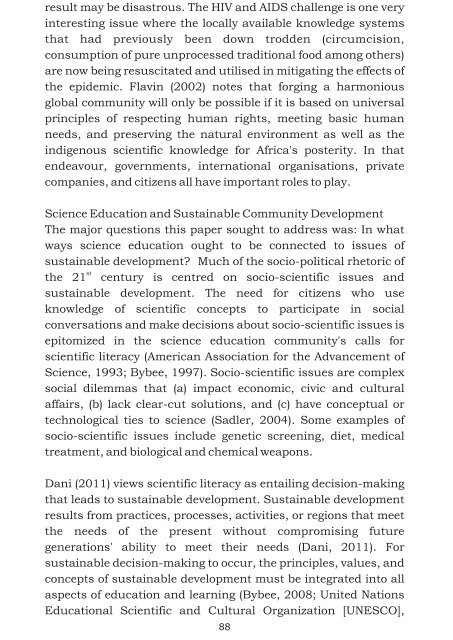Beneficiaries are actors too.pdf - Southern Institute of Peace ...
Beneficiaries are actors too.pdf - Southern Institute of Peace ...
Beneficiaries are actors too.pdf - Southern Institute of Peace ...
You also want an ePaper? Increase the reach of your titles
YUMPU automatically turns print PDFs into web optimized ePapers that Google loves.
esult may be disastrous. The HIV and AIDS challenge is one very<br />
interesting issue where the locally available knowledge systems<br />
that had previously been down trodden (circumcision,<br />
consumption <strong>of</strong> pure unprocessed traditional food among others)<br />
<strong>are</strong> now being resuscitated and utilised in mitigating the effects <strong>of</strong><br />
the epidemic. Flavin (2002) notes that forging a harmonious<br />
global community will only be possible if it is based on universal<br />
principles <strong>of</strong> respecting human rights, meeting basic human<br />
needs, and preserving the natural environment as well as the<br />
indigenous scientific knowledge for Africa's posterity. In that<br />
endeavour, governments, international organisations, private<br />
companies, and citizens all have important roles to play.<br />
Science Education and Sustainable Community Development<br />
The major questions this paper sought to address was: In what<br />
ways science education ought to be connected to issues <strong>of</strong><br />
sustainable development? Much <strong>of</strong> the socio-political rhetoric <strong>of</strong><br />
st<br />
the 21 century is centred on socio-scientific issues and<br />
sustainable development. The need for citizens who use<br />
knowledge <strong>of</strong> scientific concepts to participate in social<br />
conversations and make decisions about socio-scientific issues is<br />
epitomized in the science education community's calls for<br />
scientific literacy (American Association for the Advancement <strong>of</strong><br />
Science, 1993; Bybee, 1997). Socio-scientific issues <strong>are</strong> complex<br />
social dilemmas that (a) impact economic, civic and cultural<br />
affairs, (b) lack clear-cut solutions, and (c) have conceptual or<br />
technological ties to science (Sadler, 2004). Some examples <strong>of</strong><br />
socio-scientific issues include genetic screening, diet, medical<br />
treatment, and biological and chemical weapons.<br />
Dani (2011) views scientific literacy as entailing decision-making<br />
that leads to sustainable development. Sustainable development<br />
results from practices, processes, activities, or regions that meet<br />
the needs <strong>of</strong> the present without compromising future<br />
generations' ability to meet their needs (Dani, 2011). For<br />
sustainable decision-making to occur, the principles, values, and<br />
concepts <strong>of</strong> sustainable development must be integrated into all<br />
aspects <strong>of</strong> education and learning (Bybee, 2008; United Nations<br />
Educational Scientific and Cultural Organization [UNESCO],<br />
88


